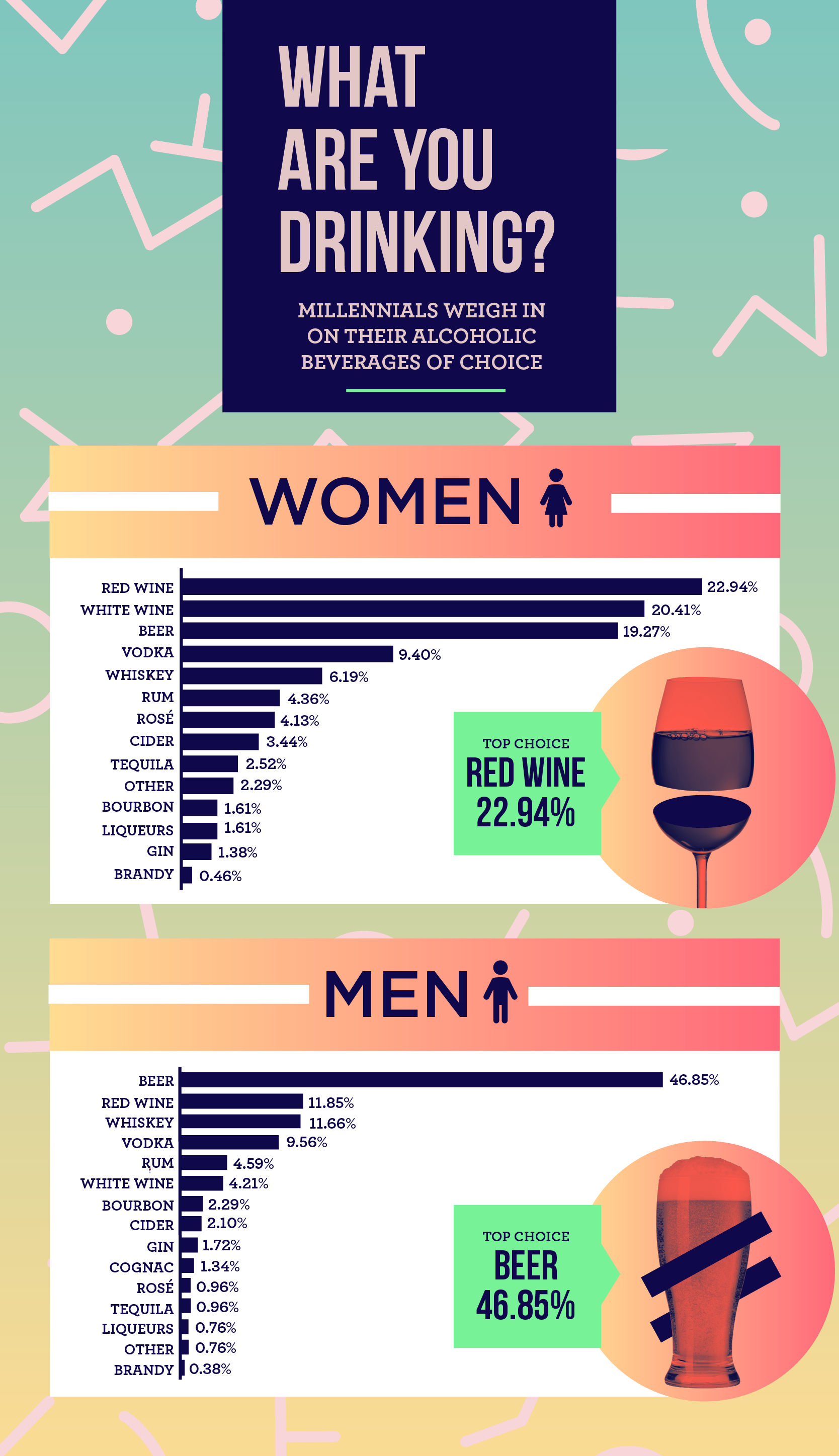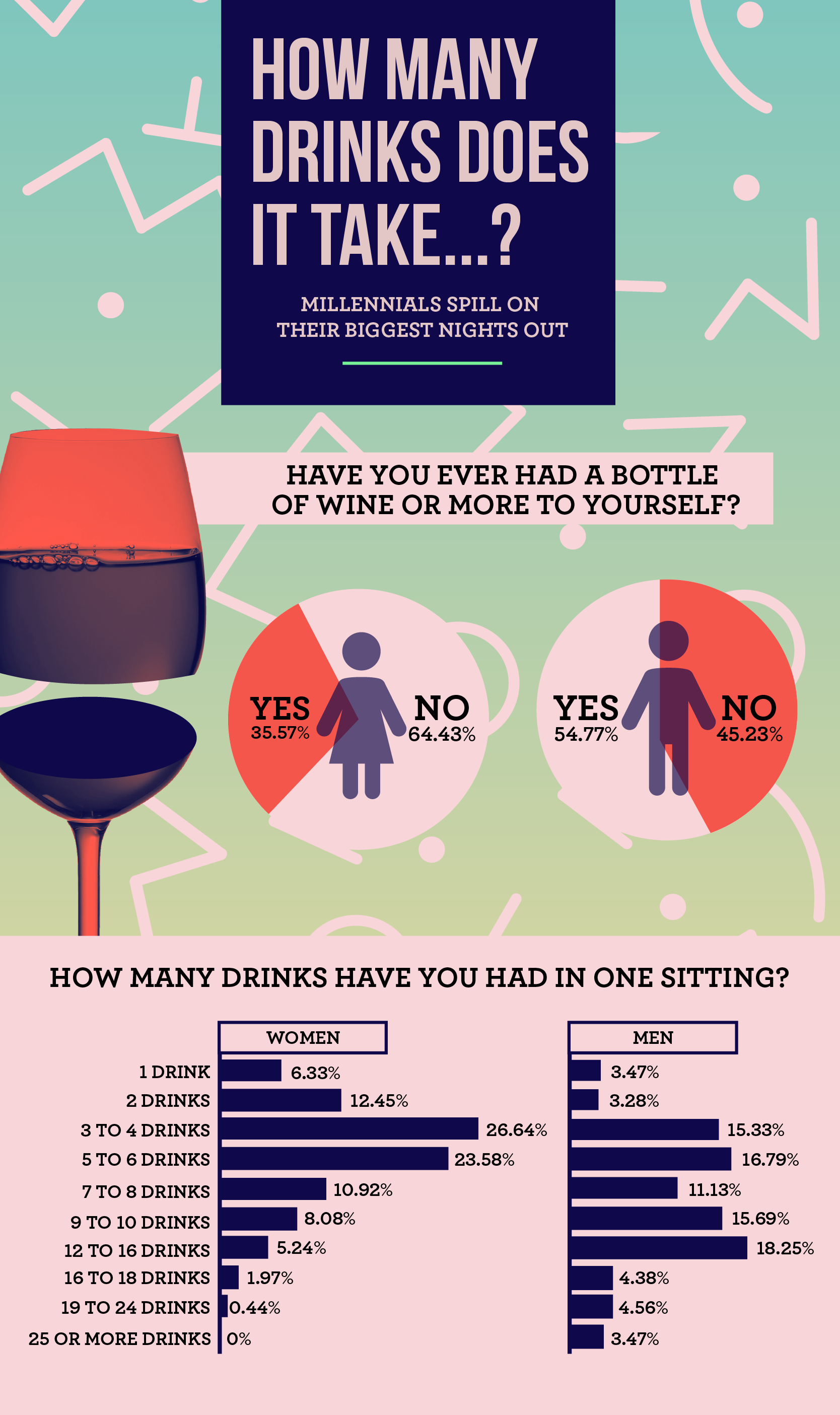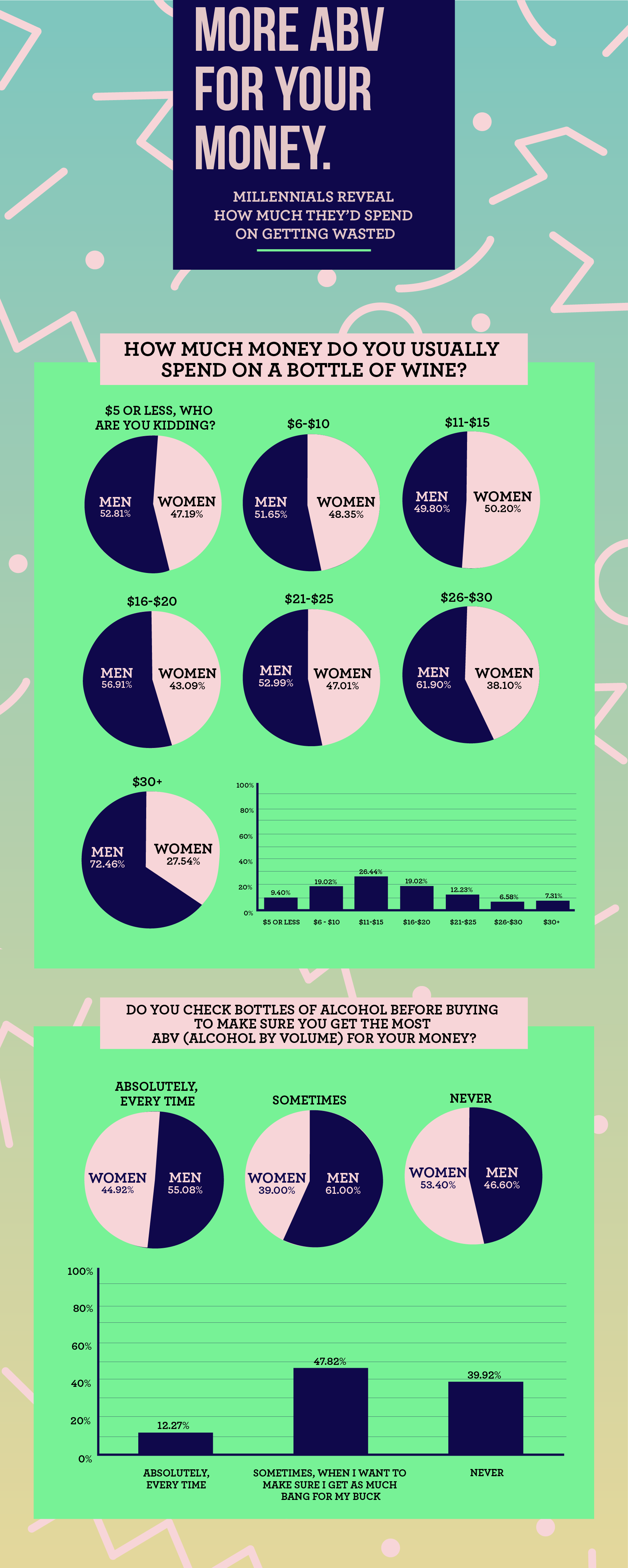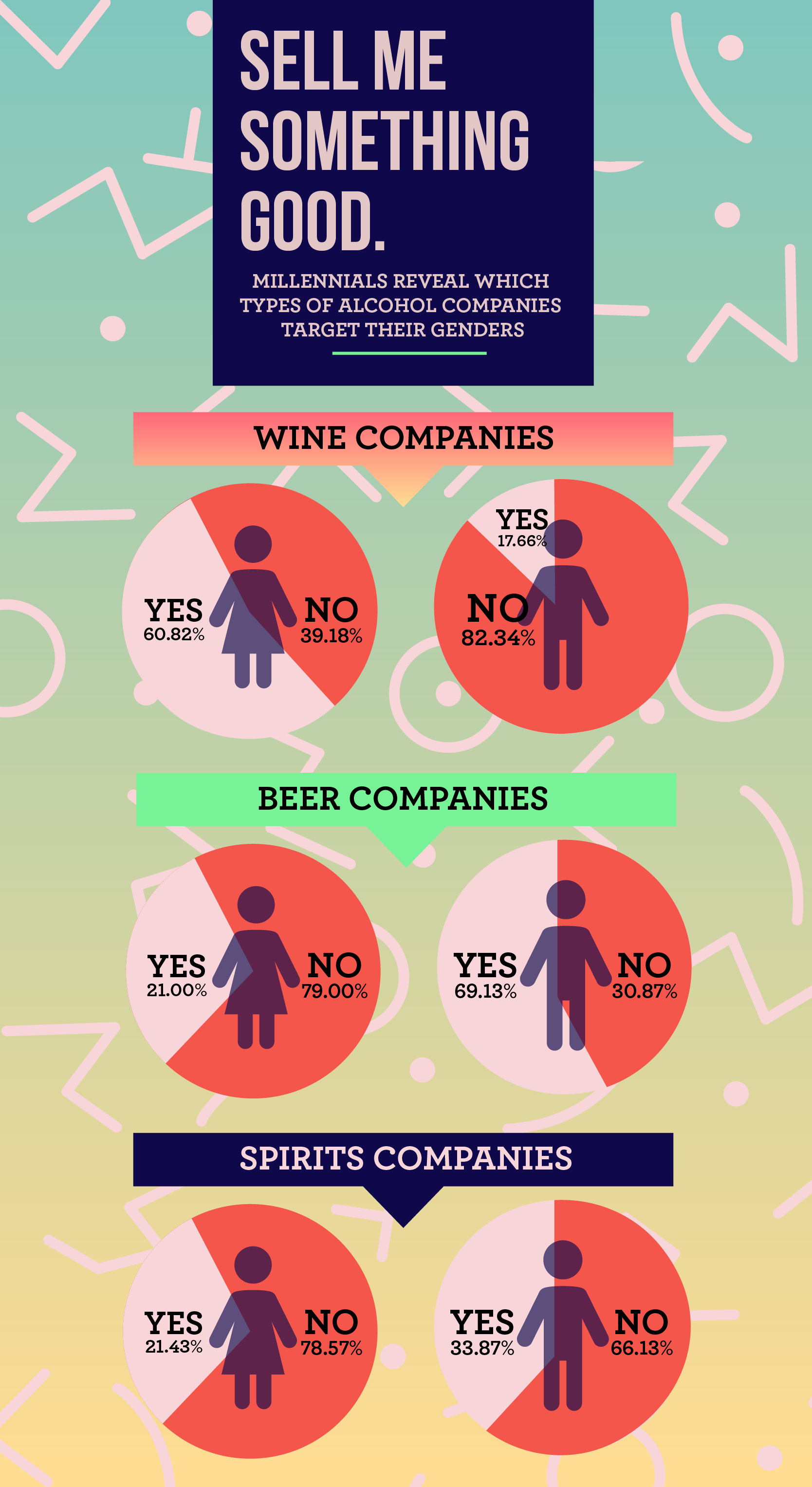
When it comes to the way millennials consume alcoholic beverages, there’s a lot of conflicting information out there. Is there a Millennial alcohol addiction or a Millennial drinking problem or isn’t there? Millennials can’t afford to drink thanks to student loans and housing costs, one study says. They drink more expensive alcohol, reports another. Millennials are too health-conscious to drink much alcohol, one article insists. They love their booze, asserts another.
To get the real story, we went straight to the source: the millennial generation themselves. We surveyed 1,000 young men and women across the country about their drinking habits—what they’re drinking and how much, what they really spend on wine, what compels them to hit the bottle, and whether or not they’re candidates for alcohol rehab. Read on to discover millennial drinking trends and their true feelings about booze.
Drinks of Choice for Millennial Women and Men
Red wine is the top drinking desire for nearly a quarter of female millennials, while white wine is the beverage of choice for about a fifth. Another one-fifth of millennial women prefer to crack open a cold brew.
For male millennials, it’s all about beer: Though millennials have been accused of killing the beer industry, nearly half of our survey respondents report a cold brew is their go-to beverage (a huge proportion compared with the 12 percent who like the No. 2 choice – red wine). But while sales may be faltering for major producers of macrobrews, craft beer sales are actually on the rise in the beverage industry.
According to the Brewers Association, 57 percent of millennials say they drink craft beer weekly. What’s the deal with craft beer? According to experts, it plays into their preference of supporting brands they trust, valuing authenticity, and expressing their individuality.
Nearly 12 percent of men prefer whiskey, while 10 percent of both men and women like vodka. The least popular drink? Brandy. However, that might change: This spirit distilled from wine—considered a “misunderstood spirits category” by some experts—appears to be making a comeback.
Average Number of Drinks for Millennial Men and Women
Sure, Millennial women love their wine—but not all of them enjoy polishing off an entire bottle. Among our survey participants, only 36 percent of women say they’ve consumed a whole bottle themselves. However, men are a little different: Nearly 55 percent of respondents have finished an entire bottle without sharing.
As for the most drinks consumed in one sitting, the most common max for men is a whopping 12 to 15 beverages, which is ripe for Millennial alcohol addiction. In comparison, 3 to 4 drinks were the most common for the highest percentage of female participants. Over 3 percent of men say their alcohol consumption consists of 25 or more drinks in one sitting, though no women have done so.
The CDC defines binge drinking as “a pattern of drinking that brings a person’s blood alcohol concentration (BAC) to 0.08 grams percent or above.” Typically, this occurs when women consume four or more drinks in two hours and men drink five or more. Although people of all ages binge drink, it is most common among people aged 18 to 34. If you or anyone else you know has a Millennial drinking problem, consider alcohol rehab or in house rehabilitation at a treatment center for alcohol in Florida.
Cost and Alcohol Content of Millennial’s Drinks
There’s no denying drinking can be an expensive habit—particularly for those that are cash-strapped. According to wine retailer Vivino, the cost of an average bottle of white wine averages $14.41, while an average bottle of red wine costs $15.66.
How much are today’s men and women willing to spend? Among those in our survey who report they’ve spent less than $5 on a bottle, slightly more were men. However, men are significantly more likely to splurge: Among respondents who said they’d spend $25 or more on a bottle of wine, 72 percent were men. The most popular price for women respondents? The reasonable $11 to $15 range, which also proved to be the most popular price range for 26% of our total respondents.
Aside from cost, some people consider another factor when they purchase booze: the Alcohol by Volume (ABV). Among our respondents, more men than women report that they try to get the most bang for their buck when it comes to alcohol content. It also turns out that alcohol recovery or in house rehabilitation might be a good option for Millennial alcohol addiction.
The Top Reasons Millennials Drink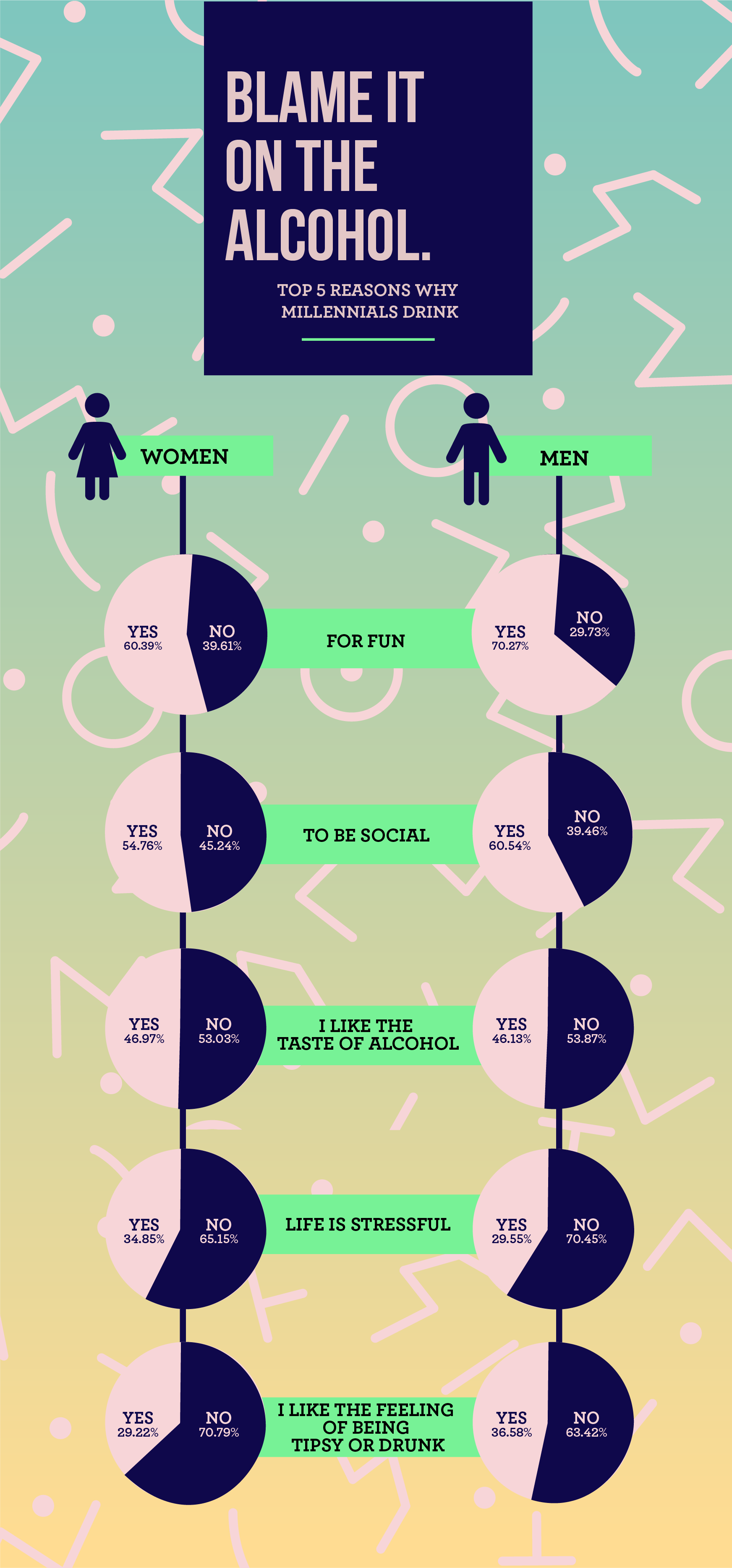
Alcohol is expensive, it comes with health risks, and it can cause Millennial drinking problems. So why do people drink? According to our respondents, the top reason is a simple one: They drink for fun. Around 70 percent of men and 60 percent of women cited this reason. The No. 2 factor is to be social—as many people know, sticking to soda while everyone else gets smashed isn’t exactly easy (or fun).
Interestingly, just under half of both men and women say they drink because they like the taste of alcoholic drinks. While it’s not surprising that someone may enjoy, say, the spicy tomato flavor of a Bloody Mary or the tangy lime taste of a margarita, it turns out actual alcohol is also tasty to some. According to research, genetics may play a role: A person’s bitter receptor genes can determine whether booze tastes good or not.
The stresses of everyday life and a penchant for that tipsy/drunk feeling round out the top five list. Anyone who’s poured a glass of wine after a bad day knows that drinking certainly is a temporary stress reliever—after all, it’s a sedative, which will calm your racing heart and help you relax. However, experts advise against regularly indulging in a stiff drink to ease your worries. Instead, consider exercising, carving out alone time, or taking a warm bath.
What Millennials Think About Alcohol Marketing
According to Adweek, advice from friends and family is the top factor when people purchase a certain type of alcohol. However, from a marketing standpoint, brand history or tradition, product packaging, and brand engagement also come into play. What do our millennial respondents think about the way certain beverages are marketed?
Around 61 percent of women feel that wine companies target their gender, compared with only 18 percent of men. As for beer, on the other hand, only 21 percent of women think beer companies market to them, while 69 percent of men believe they do. Interestingly, when it comes to spirits companies, neither gender feels targeted: 79 percent of women and 66 percent of men believe hard booze is not marketed to their gender.
Millennial Alcohol Addiction
Millennials who have reached the legal drinking age group represent only one-quarter of adults over 21; however, they drink 32 percent of spirits in the United States, 35 percent of the beer, and 42 percent of the wine.
If you or someone you love is struggling with Millennial alcohol addiction, get the help you deserve today. Opting out of heavy drinking yields a number of benefits: You can forge more meaningful connections with people, take better care of your body, and be more productive at work, among many other reasons. Consider going into alcohol recovery at an alcohol rehab to be your best self. At FHE Health, we believe complete treatment needs to encompass the whole person – mind, body, spirit, and brain – in order to be truly successful. We’re a South Florida alcohol treatment facility and with our customized detox programs, regulated inpatient and outpatient care programs, and state-of-the-art-facilities, FHE Health, a premier mental health, and addiction treatment facility is your partner on the road to recovery. Let us help you on your path towards a happy and healthy future with a sober living program. Visit us online a FHERehab.com or call (833) 596-3502 now to learn more.
Methodology
We used a convenience sampling (resulting in 1,021 respondents) of people from 50 states and the District of Columbia. Sampling error results from collecting data from some, rather than all, members of the population. For our survey, we report a margin of sampling error for the total sample and for key subgroups (in this case, Millennials) analyzed in the report. For example, a sampling error for 1,500 completed interviews is +/- 2.9 percentage points with a 95% confidence interval, meaning that in 95 out of every 100 samples of the same size and type, the results obtained would vary no more than 2.9 percentage points from the result if it were possible to interview every member of the relevant population.
Sources
